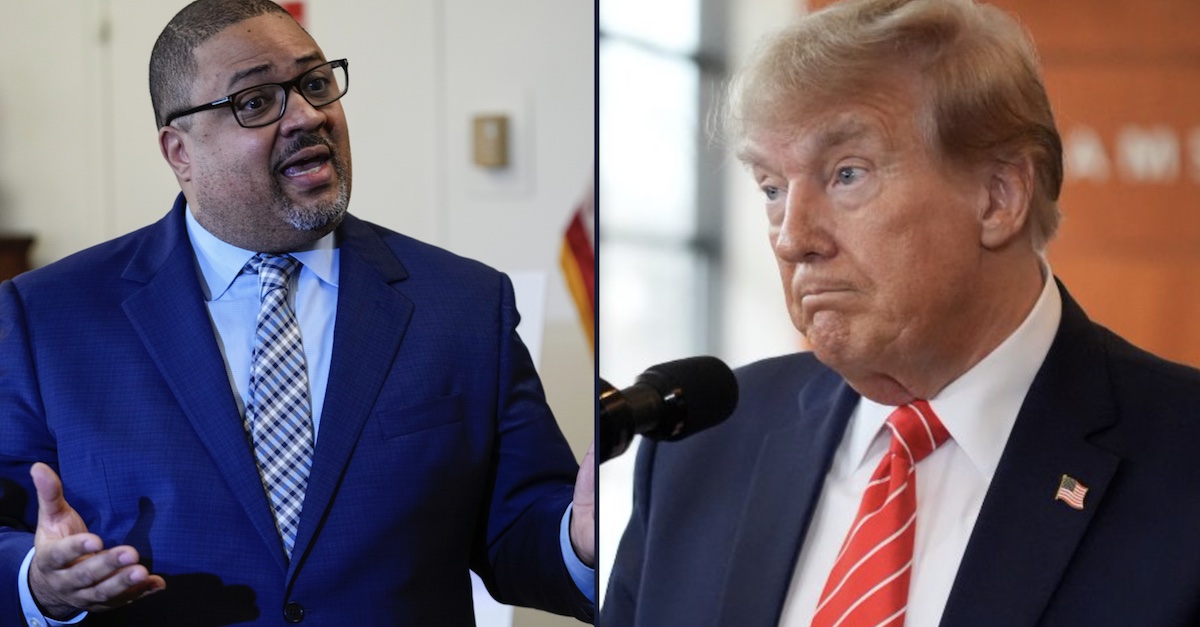
Left: Manhattan District Attorney Alvin Bragg speaks during a news conference on Feb. 22, 2024, in New York (AP Photo/Frank Franklin II). Right: Former President Donald Trump speaks after meeting with members of the International Brotherhood of Teamsters at their headquarters on Jan. 31, 2024, in Washington (AP Photo/Andrew Harnik).
Prosecutors with the Manhattan District Attorney’s Office on Thursday urged the U.S. Supreme Court to reject Donald Trump’s request to delay Friday’s sentencing hearing in the criminal hush-money case out of New York.
Trump last year was convicted by a jury on 34 felony charges relating to payments made to adult film star Stormy Daniels in connection with her alleged affair with Trump prior to his first term in office.
Trump on Wednesday filed a 51-page emergency application with the high court in which he argued that immunity granted to a sitting-president also extends to shield a president-elect from prosecution “during the brief but crucial period of Presidential transition, while he engages in the extraordinarily demanding task of preparing to assume the Executive power of the United States.”
DA Alvin Bragg, in 44-page filing opposing the application, implored the justices not to intervene in the case.
Bragg, along with Appeals Division Chief Steven Wu and Deputy Chief Alan Gadlin, pushed back on the novel argument that a president-elect is entitled to prosecutorial immunity, emphasizing that Trump’s underlying conduct and subsequent conviction took place while he was a private citizen and involved “wholly unofficial” actions for which “there is no presidential immunity.”
“Defendant now asks this Court to take the extraordinary step of intervening in a pending state criminal trial to prevent the scheduled sentencing from taking place — before final judgment has been entered by the trial court, and before any direct appellate review of defendant’s conviction,” prosecutors wrote. “There is no basis for such intervention.”
The filing asserts that the “extraordinary” relief Trump is requesting has never before been sought and would set a dangerous precedent for the court by creating a new form of “President-elect immunity” from whole cloth.
“[D]efendant makes the unprecedented claim that the temporary presidential immunity he will possess in the future fully immunizes him now, weeks before he even takes the oath of office, from all state-court criminal process,” the filing states. “This extraordinary immunity claim is unsupported by any decision from any court. It is axiomatic that there is only one President at a time. Non-employees of the government do not exercise any official function that would be impaired by the conclusion of a criminal case against a private citizen for private conduct. And as this Court has repeatedly recognized, presidential immunity is strictly limited to the time of the President’s term in office.”
Acting New York Supreme Court Justice Juan Merchan this week rejected Trump’s claim of president-elect immunity. The state’s intermediate appellate court and highest court both followed suit in refusing to halt the sentencing hearing.
Bragg further argues that recognizing Trump’s immunity claim would conflict with the high court’s own precedent as set forth in last year’s landmark case granting a president absolute immunity from prosecution for official acts.
“No judicial decision or guidance from the Department of Justice has ever recognized that the unique temporary immunity of the sitting President extends to the President-elect,” the filing states. “Such an extension would conflict with this Court’s holdings that Article II vests the entirety of the executive power in the incumbent President alone and that only the incumbent is charged with performance of the executive duty under the Constitution.”
Bragg and company also argued that the U.S. Supreme Court does not have jurisdiction to intervene in state criminal court proceedings at such an early stage in the process.
“As a threshold matter, this Court lacks jurisdiction over a state court’s management of an ongoing criminal trial when defendant has not exhausted his state-law remedies and there has been no ‘[f]inal judgment[ ] or decree[ ] rendered by’ the New York Court of Appeals, or even the state trial court,” the filing states.
Whether or not the justices decide to intervene, Trump is unlikely to substantially affected. Merchan has already signaled that he will let the president-elect off the hook with no meaningful legal consequences, even allowing Trump to appear remotely due to the rigors of the presidential transition period.
“While this Court as a matter of law must not make any determination on sentencing prior to giving the parties and Defendant an opportunity to be heard, it seems proper at this juncture to make known the Court’s inclination to not impose any sentence of incarceration, a sentence authorized by the conviction but one the People concede they no longer view as a practicable recommendation,” Merchan wrote earlier this week.
The post ‘Unsupported by any decision from any court’: Manhattan DA urges Supreme Court to reject Trump’s ‘extraordinary’ claim that a president-elect is immune from prosecution first appeared on Law & Crime.




![Tyson Foods Plant [Photo: Food Manufacturing]](https://southarkansassun.com/wp-content/uploads/2023/08/iStock_1185520857__1_.5e441daa51cca-600x337.jpg)







![Silverado Senior Living Management Inc. [Photo: Los Angeles Times]](https://southarkansassun.com/wp-content/uploads/2023/10/download-6-4-600x337.jpg)

![China's Wuhan Institute of Virology [Photo: Nature]](https://southarkansassun.com/wp-content/uploads/2023/09/d41586-021-01529-3_19239608-600x337.jpg)
















